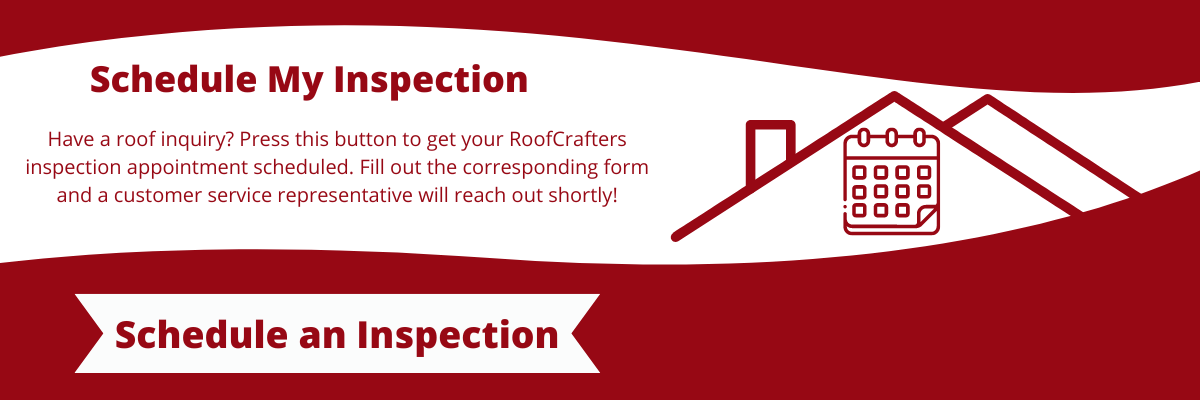What You Need to Know About Your Coastal Home's Roof
January , 2024 | 7 min. read
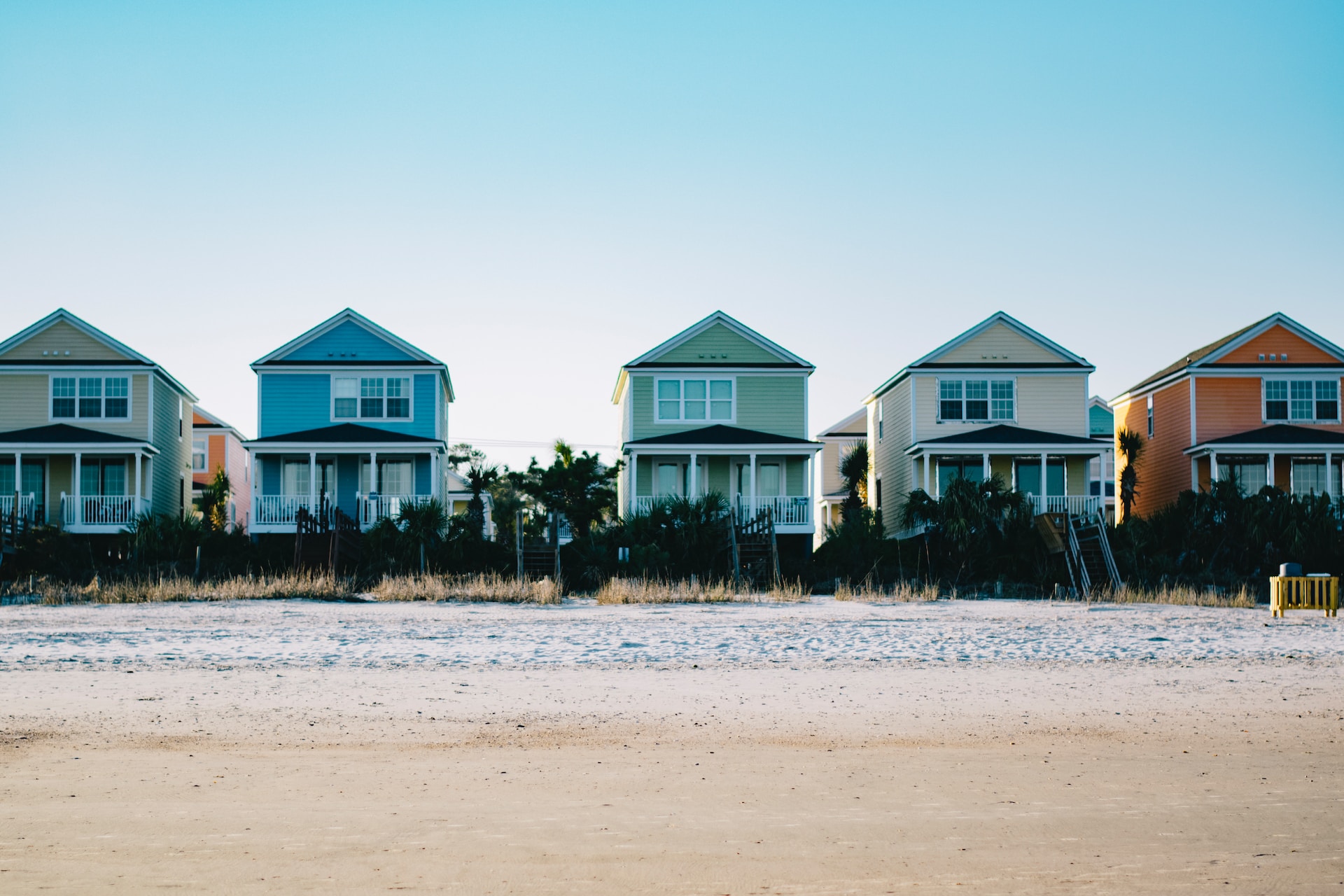
Coastal living brings an allure of breathtaking views, sunshine, and tranquility, yet it presents unique challenges, especially when it comes to protecting your home. The quest for the ideal roofing material for coastal homes involves a delicate balance between durability and resistance to the relentless forces of Mother Nature. From the corrosive effects of salty air to the battering of high winds and intense UV exposure, choosing the right roof can be pivotal in safeguarding a home against these coastal elements.
This journey doesn't end with selection; it extends into the realm of vigilant upkeep and proactive care. At RoofCrafters, we know all too well that maintaining a coastal roof demands a dedicated approach, from regular inspections to meticulous repairs, all aimed at fortifying the roof against corrosion, wear, and the whims of the ocean's environment.
That being said, if you’re lucky enough to call the beach your backyard, and are curious about proper roof protection of your coastal home, you’re in the right place! Stick around to learn how ocean proximity affects the lifespan of your roof, which roofing material is suited best for your home, and how to properly maintain your humble abode. Let’s dive right in!
How Does Ocean Proximity Affect the Lifespan of My Roof?
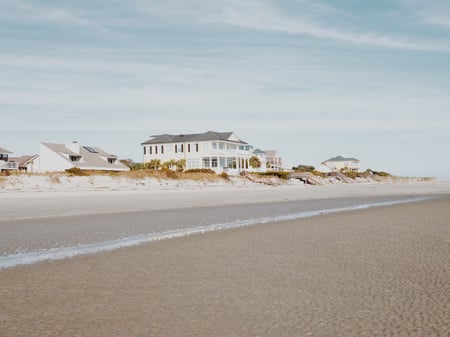
Ocean proximity can significantly impact the lifespan of a roof due to several environmental factors:
Salt corrosion: Saltwater can corrode roofing materials, particularly metal components like flashing or metal roofs. The salt in the air near the ocean can accelerate the deterioration process, potentially reducing the lifespan of these materials.
High humidity: Coastal areas often have higher humidity levels. Excessive moisture can lead to mold, mildew, and rot, affecting the integrity of the roof structure and shingles.
Strong winds: Coastal regions are prone to strong winds, especially during storms and hurricanes. These winds can cause damage to shingles, tiles, or other roofing materials, potentially shortening their lifespan.
UV exposure: The sun's UV rays are more intense near the coast. Prolonged exposure can lead to the degradation of roofing materials, causing them to become brittle, fade, or crack sooner than expected.
To counteract these effects, it's essential to invest in high-quality roofing materials designed to withstand coastal conditions. Regular inspections and maintenance are also crucial to identify and address any damage or wear promptly. Coatings or treatments specifically designed to protect against salt corrosion and UV rays can help extend the lifespan of the roof in coastal areas.
What Roofing Material Best Suits Coastal Homes?
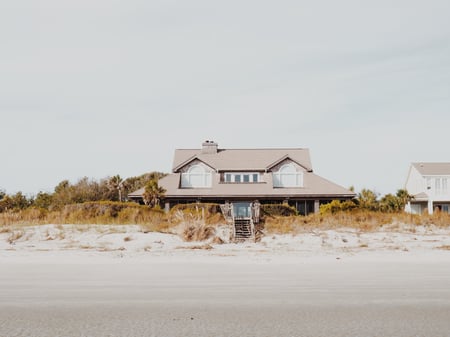
For coastal homeowners, choosing the right roofing material is crucial to withstand the specific challenges posed by the ocean environment. Here are 6 materials known for their durability in coastal areas:
.png?width=1200&height=200&name=Recommended%20Reading%20(72).png)
Metal roofing: Corrosion-resistant metals like aluminum, zinc, or galvanized steel are excellent choices for coastal homes. They're durable, resistant to salt corrosion, and can withstand high winds. Proper coatings can further enhance their longevity.
Clay or concrete tiles: These materials are sturdy and can endure harsh coastal conditions. They're resistant to moisture, and wind, and are fireproof. Regular maintenance, especially in areas prone to hurricanes, is necessary to ensure they stay intact.
Slate roofing: Slate is highly durable and can withstand saltwater exposure and strong winds. It's long-lasting and adds an elegant look to homes. However, it's heavy and may require a strong roofing structure to support it.
Synthetic roofing materials: Some synthetic options mimic the appearance of traditional materials like slate or wood shakes but offer increased durability and resistance to weathering. They're often lighter and more affordable than their natural counterparts.
Asphalt shingles: High-quality asphalt shingles treated for enhanced durability and resistance to wind and moisture can also be suitable for coastal areas. Look for shingles with strong warranties against wind damage and algae resistance.
When selecting a roofing material, consider factors like durability, resistance to salt corrosion, wind resistance, and maintenance requirements. It's advisable to consult with local roofing professionals familiar with the specific challenges of your coastal region to determine the best option for your home. Regular inspections and maintenance will also help extend the life of any roofing material in a coastal environment.
Which Material is the “Best”?
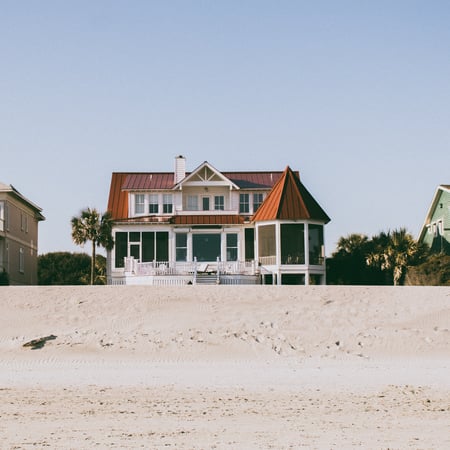
Choosing the absolute best roof for a home near the ocean can depend on various factors including budget, aesthetics, durability, and maintenance preferences. However, considering the overall resilience, durability, and suitability for coastal regions, many homeowners often lean towards metal roofs, especially those made from aluminum or zinc.
1. Aluminum roofing: Among the top choices for coastal homes, aluminum stands out for its exceptional corrosion resistance, especially from saltwater exposure. It doesn't rust, making it highly durable in coastal climates. Additionally, it's lightweight, which can be advantageous during installation.
2. Zinc roofing: Zinc is also a robust choice due to its natural corrosion resistance. Over time, it forms a protective patina that further enhances its durability and longevity. While it might have a higher initial cost, its longevity, and minimal maintenance requirements often make it a worthwhile investment.
How Can I Maintain the Roof of My Coastal Home?
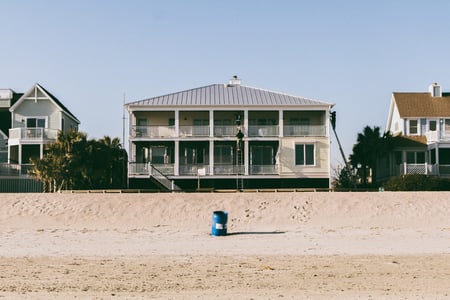
Maintaining a coastal home's roof requires proactive care due to the unique challenges posed by the ocean environment. Here are essential steps to maintain your coastal home's roof:
.png?width=1200&height=200&name=Recommended%20Reading%20(74).png)
Regular inspections: Schedule frequent roof inspections, ideally twice a year, to identify any signs of damage, loose shingles, or corrosion. Look for rust on metal components and signs of wear on other materials.
Clean debris: Remove debris, such as leaves, branches, and dirt, from the roof and gutters regularly. Debris accumulation can block drainage, leading to water pooling and potential leaks.
Check and repair flashing: Inspect and repair flashing around chimneys, vents, skylights, and any other roof penetrations. Properly sealed flashing prevents water infiltration.
Address corrosion: For metal roofs, regularly check for signs of corrosion, especially if you have aluminum or steel roofing. Treat any signs of corrosion promptly to prevent it from spreading.
Hurricane preparation: Before hurricane season, reinforce your roof if necessary and secure loose shingles or tiles. Consider hurricane straps or other reinforcements if your area is prone to severe storms.
Professional maintenance: Engage professional roofers experienced in coastal environments for periodic inspections and maintenance. They can identify potential issues early and perform repairs efficiently.
Protecting Your Coastal Home
Choosing and maintaining the right roof for coastal homes is a meticulous balance between durability, resilience, and proactive care. Opting for materials like aluminum, zinc, or other corrosion-resistant metals ensures a strong defense against salt corrosion, while sturdy installations and proper coatings fortify against UV rays and high winds.
However, the true longevity of a coastal roof lies in consistent maintenance. Regular inspections, debris clearance, and vigilant repairs safeguard against corrosion, damage, and wear. Properly sealed flashing, trimmed foliage, and timely professional interventions reinforce the roof's resilience.
In the coastal battle against nature's elements, a well-chosen roof fortified by meticulous maintenance stands as the first line of defense, ensuring a lasting shield for the home against the challenges of coastal climates. If you’re in the market for a new roof on your coastal home, be sure to hit the “Schedule an Inspection” button down below, and one of our experts will walk you through your options!
My name is Cassie, and I’m the Content Manager here at RoofCrafters. I was born and raised in Chicago, Illinois, and made my way out to Florida post-college graduation. I’m incredibly passionate about writing and creating valuable content that helps others with the collaboration of my marketing team. When I’m not working, I enjoy shopping (a little too much), spending time at the beach, and reading!



